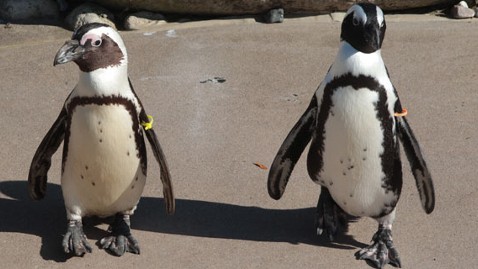‘Gay’ Penguins to Be Separated at Toronto Zoo

Toronto Zoo to separate two "gay" penguins so that they can breed. (Rene Johnston/Toronto Star)
The amorous connection between two inseparable male penguins will soon come to an end when the Toronto Zoo pairs them with females.
“The males will be put in with a specific female so they have the chance to get to know one another, and if they bond, that’s what we’re looking for,” Bill Rapley, the zoo’s executive director of conservation and wildlife, told ABCNews.com.
Buddy, 21, and Pedro, 10, lived in a zoo in Toledo, Ohio, before traveling to Canada to become part of the Toronto Zoo’s first African penguin exhibit in 18 years.
Zookeepers quickly observed courtship and mating behaviors that are typically exhibited only between males and females.
“When you put things in captivity, odd things happen,” Kevin McGowan of the Cornell Laboratory of Ornithology in Ithaca, N.Y., told ABCNews.com. “The way penguins work is they do get paired for a long time. Basically, the only other penguin they care about is their mate, so it’s important for them to find somebody who’s compatible, and if you don’t have a normal upbringing then it’s difficult to say how ‘normal’ they can be.”
Buddy and Pedro, who were both raised in captivity, pair together every night, “bray” at one another, groom each other, and never seem to tire of standing alongside each other, the Toronto Star reported.
But because the penguins have “top-notch genes,” zookeepers want them to breed with females to help populate the species, which is endangered.
According to the Toronto Zoo’s website, the African penguin population initially declined because their eggs had been overharvested, and many of their habitats had been disturbed. Today, oil pollution and a shrinking food supply exacerbated by commercial fishing are the major threats to their existence.
The zoo is now engaged in a species survival plan to help the species populate.
But just because Buddy and Pedro are placed with females doesn’t mean they will want to pair with them, which might pose a challenge to the zoo’s attempts at animal husbandry.
“They don’t necessarily do what you want them to do, and what can be kind of tricky is getting them to accept the mate you want them to have,” said McGowan.
Part of the reason penguins tend to be so picky about their mates, he said, is because rearing chicks is “one of the hardest working times of their lives,” McGowan said. “There’s an awful lot of feeding.
“You can imagine if you’re going to invest so much time and energy in a chick … you would be choosy [about your mate] in that situation,” he said. “And the penguins are relatively choosy.”
Buddy might have an easier time adapting than Pedro. Before Buddy arrived at the Toronto Zoo, he paired with a female for “quite a few years,” and they had eggs together, Tom Mason, Toronto Zoo curator of birds, told ABCNews.com. ”After she passed away, Buddy was put with Pedro at the other zoo [in Ohio] and now they’ve been put in here to specifically breed with females. We’re setting up colony of 12 – to maximize genetics and avoid inbreeding.”
But when the breeding season is over, all the birds will eventually return to the same enclosure, and “if Buddy and Pedro want to be together … they will be back together, ” said Mason.
A Few Facts About African Penguins
- Pairs mate for life
- They live about 15 to 20 years
- Both males and females incubate eggs
- The population has dropped from millions to less than 60,000 since the 1800s